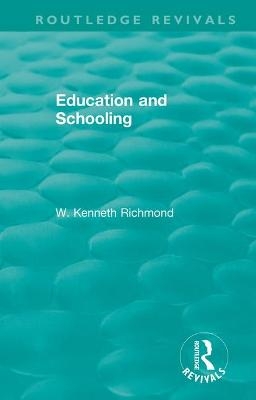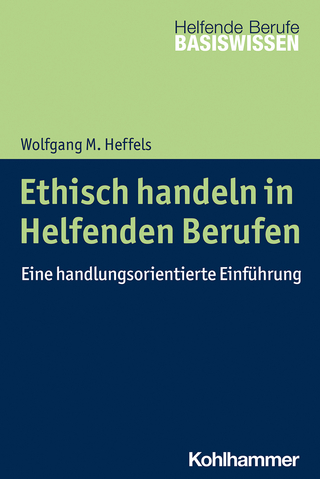
Education and Schooling
Seiten
2021
Routledge (Verlag)
978-1-138-34091-6 (ISBN)
Routledge (Verlag)
978-1-138-34091-6 (ISBN)
In the early 1970s the crisis in schools, particularly in urban areas, had escalated. The ’generative theory’ of education outlined in this book, originally published in 1975, would conceive of the learner as the controlling agent in a network of educational resources, and of education as a lifelong process.
In the early 1970s the crisis in schools, particularly in urban areas, had escalated. At the same time a number of writers had advocated either the abolition or the recasting of the school system as a whole. The late Kenneth Richmond saw these phenomena as symptoms of a struggle towards a much-needed new theory and practice of education. Increasingly, he felt, it is realised that a schooled society is not synonymous with an educative society, and that learning which stops at the age of sixteen and which makes the learner the submissive receiver of instruction and training is simply inadequate in an age of technology.
The ’generative theory’ of education outlined in this book, originally published in 1975, would conceive of the learner as the controlling agent in a network of educational resources, and of education as a lifelong process. Learning can no longer be confined within the frames and classifications imposed upon it by traditional pedagogy. Recent research evidence indicates that the importance attached to formal schooling is greatly exaggerated and that the financial and other resources devoted to the expansion of so-called educational services are largely wasted.
There is a need, the author stresses, for a much wider definition of education – one that would recognise the validity of the numerous skills acquired outside the classroom (at home, in the peer group, at the work-place) and would deliberately foster a ‘school without walls’ policy, whereby community institutions and organizations could be used as learning environments. Only by taking steps in this direction, he believes, can we overcome the apparently intractable problems of the schools today.
In the early 1970s the crisis in schools, particularly in urban areas, had escalated. At the same time a number of writers had advocated either the abolition or the recasting of the school system as a whole. The late Kenneth Richmond saw these phenomena as symptoms of a struggle towards a much-needed new theory and practice of education. Increasingly, he felt, it is realised that a schooled society is not synonymous with an educative society, and that learning which stops at the age of sixteen and which makes the learner the submissive receiver of instruction and training is simply inadequate in an age of technology.
The ’generative theory’ of education outlined in this book, originally published in 1975, would conceive of the learner as the controlling agent in a network of educational resources, and of education as a lifelong process. Learning can no longer be confined within the frames and classifications imposed upon it by traditional pedagogy. Recent research evidence indicates that the importance attached to formal schooling is greatly exaggerated and that the financial and other resources devoted to the expansion of so-called educational services are largely wasted.
There is a need, the author stresses, for a much wider definition of education – one that would recognise the validity of the numerous skills acquired outside the classroom (at home, in the peer group, at the work-place) and would deliberately foster a ‘school without walls’ policy, whereby community institutions and organizations could be used as learning environments. Only by taking steps in this direction, he believes, can we overcome the apparently intractable problems of the schools today.
W. Kenneth Richmond
1. Introduction 2. Education and Schooling: What’s the Difference? 3. Education and Schooling: A Spectrum of Opinion 4. The Knowledge Market 5. Learning in the Community: Organizing a School Without Walls 6. The Vision of Edgar Faure 7. Lifelong Learning in an Age of Technology 8. Towards a Generative Theory of Education 9. The Two Cultures and the Information Revolution 10. Beyond Schooling: The Search for a New Paradigm. References. Index
| Erscheinungsdatum | 21.01.2020 |
|---|---|
| Reihe/Serie | Routledge Revivals |
| Verlagsort | London |
| Sprache | englisch |
| Maße | 138 x 216 mm |
| Gewicht | 249 g |
| Themenwelt | Sozialwissenschaften ► Pädagogik ► Allgemeines / Lexika |
| Sozialwissenschaften ► Pädagogik ► Bildungstheorie | |
| ISBN-10 | 1-138-34091-X / 113834091X |
| ISBN-13 | 978-1-138-34091-6 / 9781138340916 |
| Zustand | Neuware |
| Haben Sie eine Frage zum Produkt? |
Mehr entdecken
aus dem Bereich
aus dem Bereich
Einführung in die Theorie transformatorischer Bildungsprozesse
Buch | Softcover (2023)
Kohlhammer (Verlag)
CHF 47,60
eine handlungsorientierte Einführung
Buch | Softcover (2023)
Kohlhammer (Verlag)
CHF 49,95


